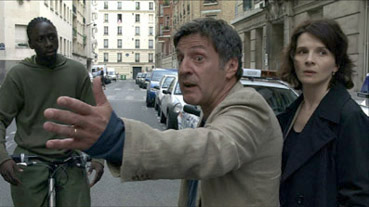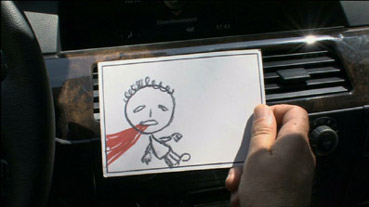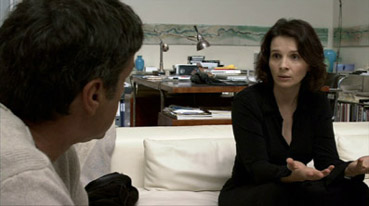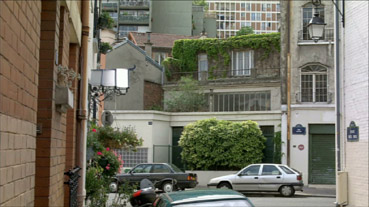"What
wouldn't we do not to lose what's ours?" |
Majid |
There's
a nice little film trick played on the audience in the opening
minutes of Michael Haneke's disarmingly gripping Hidden [Caché]. A static shot of a town
house, filmed from the side road opposite, plays uninterrupted
for three minutes, a long time in film terms. Minor distraction
is supplied as the opening credits type quietly out at the
top, arranged in the way they might appear on the movie poster.
Once they have concluded, we we are left once again with the
house. Nothing particularly significant happens. Cut to
the same house, different angle, later that evening. The road is now dark, and the occupiers emerge, look around
for something or someone, then go back inside. Cut back
to the first shot and the house is once again bathed in
sunlight. Just as you're starting to have a sense of temporal
displacement, the image is rewound and voices are heard
discussing the content of what we now realise is a video tape, one
that both we and the two characters who emerged from
the house in shot 2 have been watching. See this in a cinema
and there is an instant reaction, that smiling "ahhh"
that occurs when an audience has been misled but appreciates the artistry used to effect
the deception. It's a trick that will be repeated later
on and will produce exactly the same response.

Yet
as with every other element of Haneke's film, the scene
has purpose, developing his ongoing interest in society's
perception (or otherwise) of the difference between real life and the
image of it presented to us by the media in its various
guises. The trick here is that on screen, whether in
the cinema or on DVD, you really cannot tell film action
from watched tape until the director clues you in. Video
footage has proved an integral aspect of may films before,
from Sidney Lumet's The Anderson Tapes
and Hideo Nakata's Ringu to the works of
Atom Egoyan and even Haneke himself, but its very nature
as video footage – grainy, fuzzy, low resolution – has always
been used to identify it as such. By shooting on high-def
and grading the in-story video to look the same as the
feature, Haneke eliminates the visual clues that enable
us to separate what both we and the characters are watching,
something extended later to the presentation of memories
and even nightmares. Just what is real, here? Is it live,
or is it Memorex?
The
tapes in question have been left on the doorstep of TV presenter
Daniel Laurent and his book publisher wife Anne. There is
initially no accompanying note, and the tapes consist of
single, static shots of the house exterior, but filmed from
a position that should have made the camera and its operator
clearly visible to the couple when they went outside. But
they weren't. If some of you are hearing bells of recognition
here, it's because this setup is similar to the one in David Lynch's
Lost Highway,
a link underscored by the a family name shared by the lead characters here and a someone whose apparent death is the initial story trigger of Lynch's
film. The similarities extend to the relationships at the
centre of both films, which are already in trouble and during the course of the story will see further disintegration.
Yet while in Lost Highway we then move into
the territory of waking nightmare, Hidden
stays rooted firmly in the real world. Both are essentially
thrillers, but the noir horror of Lynch is here replaced
by social drama with a political undercurrent. Some of the same
triggers may occur in both, but these are otherwise two
very different films.
The
title of Haneke's film is itself open to multiple readings,
though at first does seem specific to the lead characters and
their social standing. Their marriage is slowly collapsing,
Anne may or may not be having an affair, and their young
son Peirrot is showing signs of increased disconnection
with his parents, but they continue to uphold the middle
class rituals that define who they are. Every
aspect of their lives involves keeping things concealed, whether
it be the truth from their friends or from each other, or
even the comments that are carefully edited from Georges's TV discussion
show. As further video tapes show up, wrapped in
child-like drawings decorated with images of blood, the
family tension increases. Are they threats or accusations?
Only George seems to have an inkling of who may be behind
this, something that seems to be confirmed when one tape
provides him with the route to an unknown apartment...

The
real problem with engaging in any detailed discussion
on Hidden is that to do so would mean revealing
a number of key plot points that should be discovered only on the first viewing of the film, but not to do so makes it difficult
to qualify some of the claims I'd happily make for the film's
subtle complexity, depth and effectiveness. There is brief
reference, for example, to the massacre of 17th October
1961, when, in the final stages of the Algerian War for Independence,
aproximately 200 Algerians were killed by French Police working
under orders from Chief of Police Maurice Papon. No detail
on the statement is provided, but this reflects a long-standing
and widespread refusal to discuss the issue in the very
country in which it took place, and as a film targeted at a primarily French audience, it needs no expansion.
"Enough said," concludes Georges uncomfortably
after saying very little, and in a single short statement
becomes symbolic of white French society at large when it comes to any fruitful discussion about 'the Algerian issue'.
Similar
layering surrounds a moment of sudden and jarring violence
later in the narrative, an event that would be too easy
to dismiss as shock tactics (the collective reaction in
a full cinema is something to witness), but which both prompts
the final emergence of a buried truth and further illustrates
the self-centred nature of the most directly affected character. But the act
itself also has political resonance, something a friend
of mine who works directly with Algerian refugees found
particularly powerful, having heard a disturbing share of
tales involving just such a violent act. Thematically,
the film also sees a revival of Haneke's interest in the
cause and effect of chaos theory first explored in the remarkable
Code Unknown, where a thoughtless and selfish
action, however insignificant to the perpetrator, can have
far reaching consequences for others.
As
the narrative progresses, the possible interpretations and
applications of that seemingly simple title increase. Conversations take place after scenes have concluded or too
far away for us to hear, confessional faces are concealed by
the dark of night, and feelings of guilt and responsibility
are wilfully buried so that the rituals of public and private
life can continue untainted. The film itself remains secretive
about key narrative elements, leaving the audience to speculate
and perhaps devise their own theories about what has taken
place, which itself prompted a discussion between myself and two friends that
even threw up a partially metaphysical reading for one element.
Despite its ostensibly thriller structure, there is
no final, comfortable resolution for the characters or the
narrative, which ends on an unmoving, enigmatic wide shot
that is itself plump with suggestion, especially for those
paying close attention to all areas of the screen.

Hidden uses the trappings of the thriller to explore wider issues,
both social and domestic, and does so with a subtlety
and intelligence that is only fully appreciated a couple
of viewings in, when a foreknowledge of things to come presents
alternative readings of the actions and dialogue that precede
it. The cast is uniformly impressive, with Daniel Auteuil
as George and Juliette Binoche as Anne never letting their
frustration and barely controlled anger slip into melodrama,
and really showing their worth in the smallest of moments,
while both Maurice Bénichou and Walid Afkir are also
quietly excellent in roles I have deliberately avoided writing about
here. Particularly effective is the economy in the dialogue
and performance, with complete back stories hinted at through
short verbal exchanges and the manner of their delivery, and even seemingly
throwaway lines sometimes laced with deeper meaning. "I
have nothing to hide," says Georges at one point. "Really?"
is the simple but suggestive reply.
Haneke
has repeatedly proved his worth as one of the smartest,
albeit most pessimistic directors working in current European
cinema, and many have claimed that Hidden is
his finest film yet. I'm not so sure, as I still regard
Funny Games as a work of considerable brilliance and hold
Code Unknown in supremely high regard.
But it's certainly up there with his best work, and that's
no small recommendation in itself.
Which
brings me handily to the sometimes extreme critical response
the film has prompted. Haneke has, over the years, displayed
a nifty talent for splitting critical opinion into virtually
polar opposites, attracting passionate praise on one hand
and loudly dismissive attacks on the other. Hidden has proved no exception, with some pretty wild claims made
for the film's unbridled brilliance going up against reviews
whose negativity borders on intellectual mouth frothing.
I certainly don't agree with Mark Lawson's DVD cover-mounted
claim that this is "the first great film of the 21st
century," but a trawl through the reaction from both
camps does see those who are supportive of the film making their case
in detailed and often convincing manner, while those against
it seem driven more by bile and a deep-rooted hatred of
Haneke and his work. This appears to be partly born of a sort
of intellectualist macho, a refusal to admit being affected
negatively by a film that was designed to do just that (something particularly true of Funny Games). Not everyone will like it, which
is the way of all cinema, but some of the arguments thrown
against Hidden have been a little shallow
in scope and even contradictory, accusing it of being unfocussed
on one hand and manipulative on the other, a silly brickbat
to throw given the manipulative nature of film as a medium
and the thriller genre in particular. It may well be that one
of the unexpected triumphs of Hidden is
that in exploring the narrow views and prejudices of its
characters, Haneke has unexpectedly but effectively exposed
those of his angrier detractors.
As
mentioned above, the film was shot on High Definition video
and generally looks superb on this DVD incarnation. Detail
is excellent throughout, with contrast and colour close
to perfect. Some compression artefacts are visible in some
darker scenes, but only just. On the whole, there is little
to fault here. The framing is 1.78:1 and the picture is
anamorphically enhanced.

Dolby
2.0 stereo and 5.1 surround tracks are available, but there
is little to really choose between them. Background sound
is a little louder on the stereo track, while the spread
is more subtle on the 5.1. The LFE and rears play almost
no part in a track that is largely remarkable for its subtlety.
Only
four extra features here, but the first two are substantial
in both length and content.
The Michael Haneke
Interview (25:26), conducted by Serge Toubiana, sees the director being far more open and cheerfully chatty
about the intentions and themes of the film than I would
have expected. It includes some interesting insights into
his reading of certain aspects of his characters, and Haneke discusses the Algerian situation and the public's refusal to discuss
it in some detail, has some lovely advice about staging
and editing a scene for drama, and talks quite a bit about
the final shot, so don't watch this before seeing the film.
The
Making of Hidden (31:51) is an on-set documentary
that includes interviews with Haneke, Juliette Binoche,
Daniel Auteuil and executive producer Margaret Ménégoz,
and is useful for providing a rare look at Haneke the director
at work. His perfectionism in particular comes across, though
at one point results in him balling out the camera crew
for not delivering on a promise. Much of the time, though,
he is far more easy-going than his films might lead you
to expect, kicking against Mark Kermode's post-Funny
Games description of him as a "humourless
Austrian." Binoche wishes the director's films had
a little more light in them, while Haneke himself says cheerfully
"I'm lucky enough to make films, so I don't need to
see a psychiatrist."
The
Theatrical Trailer (2:01) very
nicely sells the thriller elements of the film without revealing
any key information from the later stages (American trailer
makers please take note), though does not really hint at
the film's dramatic layering. Well what did you expect?
It's also cut a lot faster than anything in the feature.
It IS well done, though.
There
are also Filmographies for Haneke,
Binoche and Auteuil, with a brief biography for Haneke.
Not
for everyone, sure, and if you have a bug up your bum about
Haneke already then this is going to do little to change
it. But the director has here fashioned a thought-provoking
and compelling drama in thriller clothing, and one that
is worth seeing as a group in part to be involved in the
discussion on afterwards. The best advice is to not be swayed
either by the hype or the put-downs, but to experience the film
on its own merits with as open a mind as possible, which I realise is not easy
given the weight of opinion that surrounds it. Certainly
the film plays better with a large audience, but you'll
be lucky to find it at a cinema now, and thus Artificial
Eye's fine DVD is definitely the way to go.
|